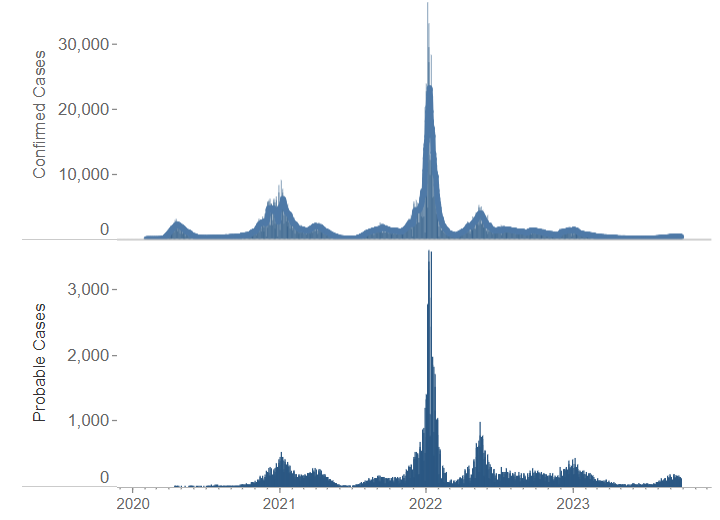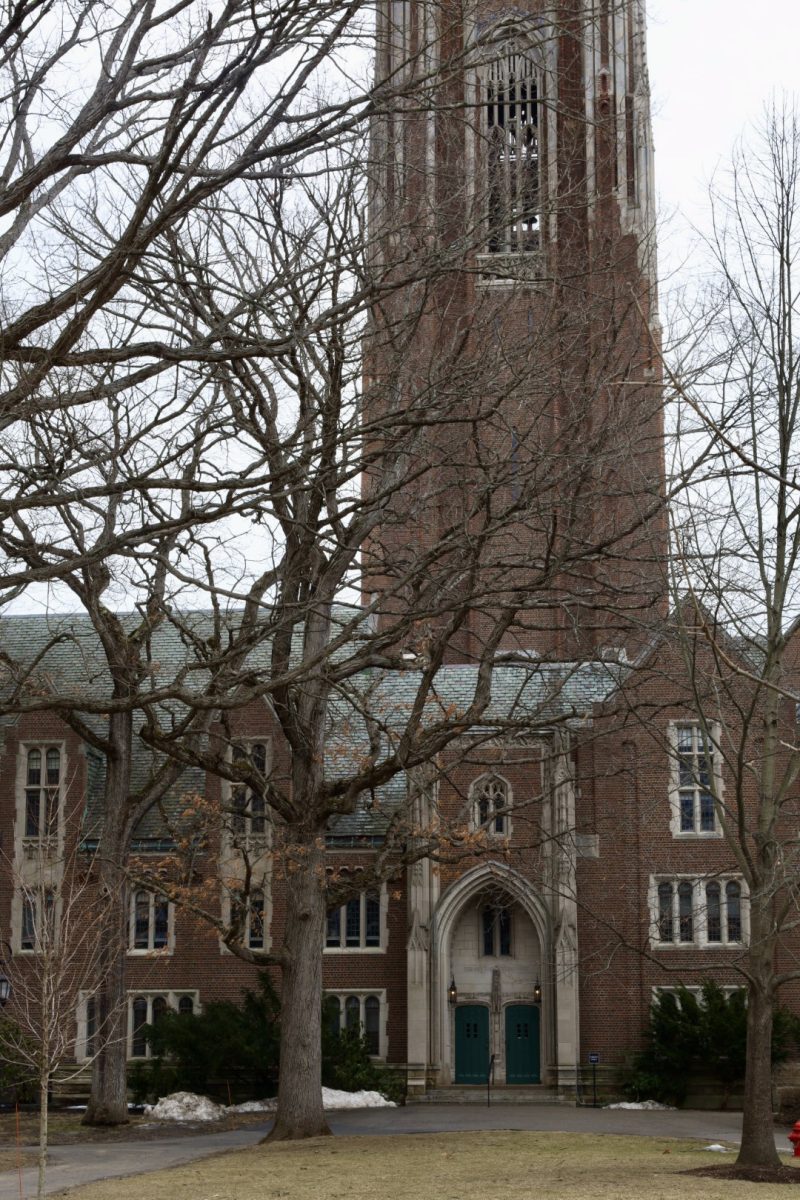Wellesley students have grappled with the policy changes that COVID-19 has brought for the past four years. The spring semester of 2020 brought the first of the changes – the college officially closed on March 16, 2020, sending almost all of their students home so classes, graduation events and Reunion could be held online. On June 30, 2020, President Johnson sent out “Wellesley’s Plan for Fall 2020 and Beyond,” detailing the policy revisions for the 2020-2021 school year and inviting first-years and sophomores to campus for the fall and juniors and seniors for the spring. Her announcement included information about the term system, remote learning and other precautionary health and safety measures. These included social distancing, mandatory masking, quarantining, regular testing and a more restrictive policy on guests and off-campus transportation. Students and administrators often referred to the campus as “The Wellesley Bubble.”.
As the College transitioned into the 2021-2022 school year, some of the policies continued. A statement from President Johnson, released on Aug. 27, 2021, outlined health and safety precautions that amended the College’s previous guidelines about campus life during the pandemic.
Students were instructed to mask in common spaces and classrooms and restricted to in-state travel, and guests were still banned from entering campus buildings. The College returned to the semester system. Once all students were invited back to campus, the College moved quarantine locations from on campus in the Dower House to The Verve, a hotel in Natick. Testing was still twice a week at the Beebe testing site or the College Club, and positive cases were tracked on the Wellesley College COVID-19 dashboard. Other policies were lifted – transportation off-campus was permitted, grab-and-go options were replaced with open dining halls, and social distancing was not required in classrooms. During the spring of 2021, the college offered a COVID-19 vaccination clinic and mandated vaccinations. Guests were eventually allowed on campus and in buildings, registered given their vaccination status.
As the pandemic seemingly lessened in severity, the administration lessened guidelines for the 2022-2023 school year. Wellesley dropped several of its COVID-19 policies, according to an email sent on July 22, 2022. As part of this, faculty members could require masking at their discretion, and weekly testing was optional and only located at the College Club. In the email, the College also announced that hotel isolation would cease. Students who tested positive for COVID-19, regardless of whether they had a roommate, were required to quarantine in the residence halls. Continuing from the year prior, visitors were allowed inside most buildings, this time without registration.
This year, COVID-19 policies have become less restrictive, regardless of the spike in COVID-19 rates. According to the State of Massachusetts COVID dashboard, there has been a small increase of cases in fall of 2023 compared to the spring and summer. Sept. 18, 2023 had a reported seven-day-average of 492 cases of COVID-19, while June 12, 2023 only had a reported seven-day-average of 137 cases.
When the COVID-19 announcement from Sheilah Shaw Horton, vice president and dean of students was released on Sept. 22, 2023, some students found themselves unhappy with the policy revisions. Iris Zhan ’27 noted that as soon as the email came out, they felt the need to share it with family members.
“I forwarded it to my parents and they were so mad,” they said. “They were like, ‘What, they don’t know how many students have COVID-19?’”.
Grace Sun, ’27 felt that the content of the email was misleading.
“From this email, without knowing how the situation really is, I would assume that it’s not that bad or that there are just a couple cases. But it’s actually far more serious than that and I think it’s a problem that the administration is addressing [it] with this level of unseriousness,” said Sun, “I think this email [feels] like it hasn’t addressed the problem. It brushes off the issue.”
The email gave an update on the COVID-19 protocol. The College is no longer recording the COVID-19 cases on campus, but vaccination and masking is still highlighted as the main form of preventing the spread. The newest COVID-19 booster is available at nearby pharmacies, and administration is working to bring a clinic to campus. Health Services offers testing to those that are symptomatic, but recommends purchasing rapid tests from pharmacies for self-testing. Health Services is no longer giving out rapid tests and no longer taking walk-ins. Health Services is available for those that test positive, but students should make an appointment by calling. Students who test positive should use their Ozzi containers to get meals to go. Asymptomatic students should mask and test on day six after exposure, but are allowed to go to class and participate in normal activities after five days of isolation. Hybrid classes are not offered for those who get COVID-19. If your roommate tests positive, both of you should wear masks and open a window. Roommates are not able to move to a different space.
For Zhan, these policy changes are not supportive enough for students on campus.
“When I got COVID-19 last week, I called the after-hours [hotline for health services], and they said because they were not open, that I had to get a test from CVS. I was fortunate enough that a friend of mine was able to get me two tests, and that’s how I knew, but I didn’t even realize that even during their open hours they wouldn’t actually give you a test [if you’re asymptomatic], which is ridiculous. Also, [Health Services] didn’t seem to be prepared or caring about everyone that’s struggling with COVID-19,” said Zhan.
Sun agrees, stating that she feels uncomfortable with the fact that masking is optional and testing is unavailable.
“I went to Health Services last week because I was not feeling well to get tested because I wanted to protect other people from myself and they said, ‘You can’t get a test from us unless you are severely symptomatic.’ I think that’s just pretty unreasonable, especially because the way to stop COVID-19 from really spreading is to catch it before it starts transmitting to other people,” said Sun.
The lack of guidelines poses difficulties for the roommates of infected students. “My roommates struggled for the many days that I was with COVID-19. [The College] doesn’t really care about what to do with the roommates. They’re like ‘Oh, mask up!’ [My roommates] had to sleep in the Bates TV room, and they also slept in the Clapp living room as well. They told me that they didn’t get much sleep, which really sucks,” said Zhan.
For many, COVID-19 is not just a small cold or a temporary ailment, and Zhan worries about it.
“I am not immunocompromised but this is so much more urgent and worse for them, so why aren’t we caring as much as we did when we had other outbreaks?” questioned Zhan.
Although Sun and Zhan are first-year students, they are aware of the previous COVID-19 policies and wish that the administration would reinstate some of them.
“If [Dower] truly is empty and not currently used, it would be great if we could put that into use again and quarantine people that have COVID-19. If we could have isolation, actual physical isolation, between students who have COVID-19 and those who don’t, even if it’s just for a couple days, I think that would improve the situation,” said Sun.
“It’s kind of like a, ‘You’re on your own, kid,’ kind-of-thing, which is surprising and what you don’t expect at a liberal arts college. Maybe at bigger schools, they will hold your hand less and care less, but this is Wellesley – they are supposed to care,” said Zhan.
According to Wellesley’s Office of Media Relations, the College “revised our COVID-19 policies in ways that will allow us to teach, learn, collaborate and build community more easily.”
“The College’s policies on testing and masking are consistent with state and federal guidance,” said the Office of Media Relations. “As of Monday, Sept. 25, free COVID-19 tests are available at covidtests.gov. Tests also may be purchased at local pharmacies and at the Bookstore in Lulu. The two best defenses against COVID-19 continue to be masking and vaccination. Members of the community are welcome to mask more often than required based on their individual health and family situations. The College also strongly encourages all community members to get the new COVID-19 booster, which provides a defense against new variants. It is available at pharmacies off-campus now, and we are working to bring a COVID-19 vaccination clinic to campus. Going forward, we will continue to align our health and safety policies with CDC guidelines.”




